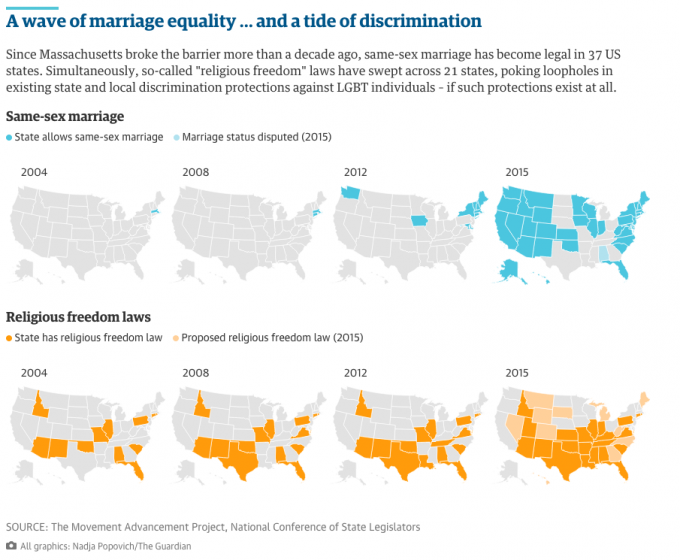Gay Rights and National Vertigo
As the U.S. Supreme Court readies itself to weigh in on same-sex marriage rulings in Michigan, Ohio, Kentucky, and Tennessee, Guardian reporter and Contexts board member Steven Thrasher looked to three couples whose own fights show, as he puts it, that “American love and justice have always been hard-won.”
Thrasher outlines a “secret culture war” fought “state by state,” with the marriage equality movement arising in the west and northeast as “three contradictory political processes were aiming to make sure that discriminating against LGBT people stays constitutional”:
- Since 1993, 20 state legislatures have enacted a series of so-called “religious freedom” restoration acts, or RFRA bills, which have recently led to national outrage but have effectively been allowing open discrimination against gay people – in public and at the workplace – during the same years that chapels have been challenged to open their doors. At the same time, acceptance arrived in the strangest of places: a different kind of RFRA, combined with laws that do protect LGBT people, has brought together an unholy alliances of religious followers and civil libertarians.
- Racial justice has been misconstrued to be at odds with LGBT rights. Black Americans were blamed for homophobia, just as a widespread backlash was unleashed upon most non-male, non-white, non-straight and non-gender conforming people. “It didn’t make any sense,” former NAACP executive director Benjamin Jealous told the Guardian, to scapegoat the black community for California’s Proposition 8 when it passed “by a margin greater than 100% of black voters” – and when black queer people remain among the most marginalised.
- The rise of marriage equality sucked money and energy from other LGBT causes such as the resurging healthcare crises of HIV/Aids and ageing, the epidemic of homeless teens, the history of children being taken from queer parents, and the legal continuation of so-called “conversion therapy” for young people in 48 states.
The first couple Thrasher visits are newlyweds—the first lesbians to marry in Alabama. Shanté Wolf-Sisson says despite the difficulties she and her wife have faced as black, married, and gay, including Shanté’s charge that she was passed over for a job when the hiring manager recognized her from the news coverage of her wedding, “I love the south.” Still, “It doesn’t stop with fear. You can be fired if you’re out publicly and your boss didn’t like it. You can be evicted. You can be outed at your church.” Her wife, Tori, adds, “Someone couple walk by and throw a Bible at us, or shoot us. It’s perfectly legal for a restaurant to kick us out.”
The second couple, ex-Mormon husbands J Seth Anderson and Michael Adam Ferguson, told Thrasher about their experiences in Utah, where Ferguson had once undergone “conversion therapy” meant to make him heterosexual. Now Utah, which has a history of unorthodox takes on marriage, has seen a recent non-discrimination bill passed with the help of “an unusual coalition of LGBT advocates, Mormons, the American Civil Liberties Union, and the business community, as well as Democratic and Republican lawmakers.” The law, it’s said, could give LGBT workers access to “over a million” jobs. Ferguson remains a staunch opponent of conversion therapy throughout the country (for adults, it’s legal in every state ), but, while Salt Lake City has become, Thrasher writes, the 7th highest per capital LGBT metro area, he struggles at home: he “can rent an apartment with his husband without fear of being kicked out, but can still be denied a hotel room or a restaurant table.”
Finally, Thrasher revisits Kitty and Cheryle Lambert-Rudd, the first couple legally married in New York in 2011. The two have fought for legislation that protects their blended family, and they are particularly involved in efforts to help homeless LGBT youth. Kitty says the country’s laws may be giving them whiplash—Thrasher cites a single week in which Arizona allowed gay couples to become foster parents while Florida “considered letting private agencies deny same-sex couples the ability to adopt”—“It’s been pretty tiring at times, but it’s been worth it. We’re being treated more like human beings. We’re normal. We are really normal.”
For more research on LGBT legal fights in the U.S., see, among others:
- “Why U.S. States Vary in the Rights and Protections They Offer to Lesbian, Gay, and Bisexual Residents,” Rebekah Herrick, Scholars Strategy Network.
- “Religious Freedom and Refusing Service. There’s Research on That!” Amy August, The Society Pages.
- “Rights and Rites: Religion at Work. There’s Research on That!” Jacqui Frost and Evan Stewart, The Society Pages.
- “Same-Sex, Different Attitudes,” Kathleen Hull, The Society Pages.
- “ENDA Ending Discrimination? There’s Research on That!” Andrew Wiebe, The Society Pages.
- “Caught in the Culture Wars’ Crossfire,” Jack Delehanty, The Society Pages.


Comments 1
Harvey E. Lopez
June 21, 2020Arts and culture is a very nice field. People who like art and culture find it very fantastic to learn it. You can learn things from “Learn Art and Culture” by YTM at T.M. convention center and I just check https://topcvwritersuk.com/thecvstore-review/ to complete the task. Thanks for sharing this blog post in the best regards of culture and art.